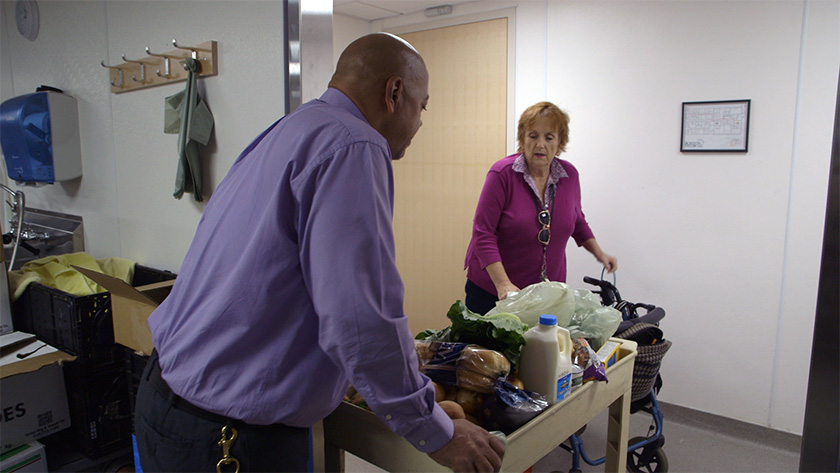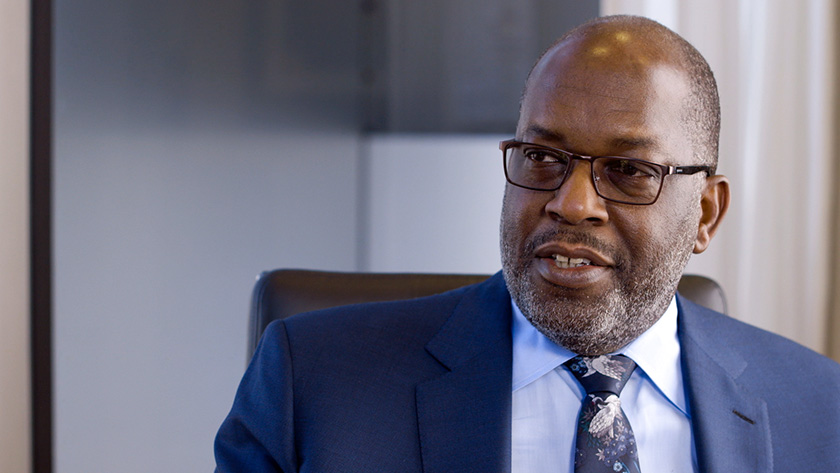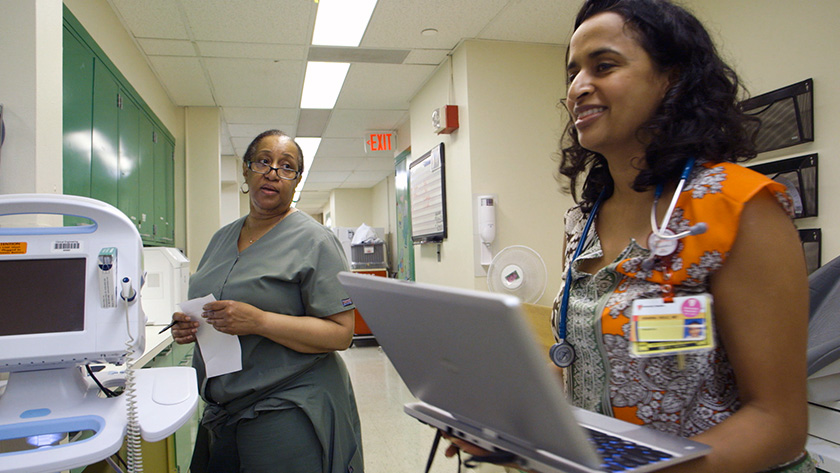Those without enough income to keep the heat on and food in the fridge are more likely to get sick than those with sufficient resources to meet these essential needs. Seems obvious, right? The healthcare sector though has been historically slow to account for the social and economic reasons for diminished health. Meanwhile, the most marginalized remain trapped in a cycle of sickness. Health Leads (2011 SASE) worked for over two decades to connect people with essential resources like food, housing, and transportation alongside traditional medical care. In addition, they work both locally and nationally to break down these systemic barriers to health. That’s a challenging story to tell. With the help of the Stories of Change initiative, a partnership between the Skoll Foundation and the Sundance Institute, Health Leads worked with Emmy-award winning filmmaker Nicole Newnham and Jenni Heywood on What Counts, a short documentary film that shows the on-the-ground reality of health disparities across several urban communities in the US, and features the healthcare leaders who are addressing the root causes. We caught up with Alex Quinn, CEO of Health Leads, to find out more about the project and what more needs to be done to build a health system that works for everyone.
Zach Slobig: The film features healthcare workers and community members in Cleveland, Boston, and Contra Costa County, all places showing a movement towards a healthcare system that prioritizes essential needs. What do these communities have in common? Why did this take root there first?
Alex Quinn: The community-driven approach to health highlighted in What Counts has been taking hold across the country for decades. Dr. Geiger and Dr. Barnes were factoring essential needs into their Mississippi clinic as early as the 1960s. But it’s gained real momentum in the last 10 years because healthcare costs continue to rise while life expectancy, health outcomes, and well-being are all declining. And it’s a lot worse for low-income people of color. Cleveland, Boston, and Contra Costa county are examples of the growing number of areas that are creating partnerships and coalitions of community members and local organizations like hospitals, public health and housing offices, faith groups, and others to redesign care based on what their communities say they need to be healthy.
Zach: These are all urban areas featured in the film. Are you seeing any progress in rural areas?
Progress in rural areas remains a challenge. Statewide initiatives in North Carolina, and others in the Upper Peninsula area of Michigan and Arkansas are demonstrating results, but the major issue with rural communities is the lack of the kind of resources that matter most to health – access to transportation, food, etc. Overall, those resources are much more accessible in an urban setting. Hospitals and health systems often play a central role in rural areas, but as more rural hospitals close due to financial pressures, those communities are left without an “anchor” institution.
What you can’t see in the film is that Contra Costa county is urban, suburban and rural. In fact, it’s one of the fastest growing areas of suburban poverty in the U.S. So it’s an interesting microcosm of the issues different areas face, which allows us to try different approaches and learn a lot about what works.

Zach: The premise here is so intuitive—those whose essential needs aren’t met suffer negative health outcomes, therefore things like food and shelter should be treated as a health issue. That intuition is backed up by data. What more needs to be done to make this clear to those with the power to change the system?
Alex: The question is no longer whether we should factor essential resources into health, but how. Now more than ever, we’re all feeling the effects of weak investments in public health and social services, and fragmentation that has forced us to compensate in incredibly complex ways to achieve not-so-great health: wide-ranging eligibility requirements for services; no national standards for payments from health systems to community-based organizations; voluntary tax overrides to cover select groups. So the problem we’re fighting is actually a multi-sector, layered system, with no one in control. We need other systems and organizations to support communities leading, because they best understand what they need to be healthy.
Zach: In the film we meet Dr. Geiger, who started the very first community health center in the Mississippi Delta some 60 years ago. He was making this same case way back then. How better off are things now?
Alex: Thankfully, we’re no longer trying to convince the healthcare system that essential needs, and social, environmental factors in our lives, impact our health. After years of blood, sweat and tears put in by public health officials, community health experts, and so many others, that concept has finally taken hold. The film is meant to inspire others that doing something about it, and working to achieve health goals that have been defined by the community, is possible and it’s happening across the country.

Zach: The film features the CEO of Kaiser Permanente. What kind of leadership is Kaiser showing in this movement toward addressing social needs?
Kaiser Permanente has shown great leadership in building infrastructure and making investments that directly address the essential needs that have been identified by their members and communities – including a $200M investment in local housing and testing and implementing essential needs screening in member calls. Their teams also broadly advocate for further focus on issues of health equity through efforts like National Alliance for the Social Determinants of Health and the Healthcare Anchor Network. They also back industry research initiatives such as the Social Interventions and Evaluation Network (SIREN).
Zach: At one point a health worker in the film says, “we’re not paid to keep people from getting sick”—pointing out the systemic shift that needs to happen. Rebecca Onie calls it “a profound reimagining of the health system”. What are the forces standing in the way?
Alex: In addition to the fragmentation of the system, healthcare in the U.S. is oriented around services and transactions, instead of relationships. Our “system” isn’t structured in a way that enables providers and caregivers to consider the full story of a person’s health. Asthma will continue to put people in the hospital if we can’t ask if housing conditions are unsafe. But that’s changing. In the last few years alone, we’ve seen increasing exploration around new payment models that change “what counts” – like insurers and providers in conversations around how CMS will pay for housing.
We have also seen healthcare systems that focus on partnering with patients, caregivers, local community based organizations and other “systems” to better design interventions that focus on health vs. disease. We have a lot to learn from other countries on this. In the developing world, as well as in Europe and elsewhere, governments understand that universal primary care access, coupled with a workforce of community health workers who can help people resolve unmet essential needs, are fundamental. It won’t happen overnight, but communities are rethinking and reshaping systems so that we’re putting health first. We hope we can accelerate that momentum.

Zach: Why is ambitious storytelling like this important for the systems-level changes needed in the health system?
Alex: People know what they need to be healthy more than institutions do. Communities can create the vital conditions for us all to be healthy. The stories from individuals and communities, combined with understanding what kind of interventions actually enable people to access (not just know about) resources, are going to drive the change we seek.
Watch What Counts at www.whatcountsashealthcare.org and register for a free online screening and discussion with the filmmaker and healthcare and community leaders.